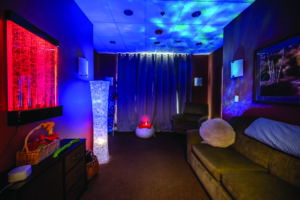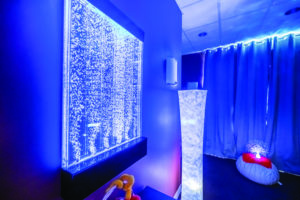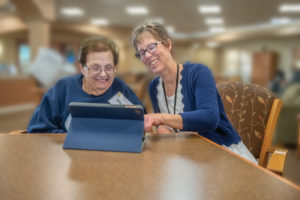
This unique sensory room at Seasons was made possible by donations in memory of Aggie Vines.
Sensory stimulation is used to help those with dementia by allowing them to stay in the moment and interact with their current surroundings. These activities can use one or more of the five senses: hearing, sight, smell, taste and touch. By offering various ways to communicate and using all five senses, those living with dementia can see some improvement in their everyday routine, cognition and even memory.
For those with dementia who have lost their ability to connect with the world around them, using everyday objects to stimulate senses can trigger positive thoughts, memories, or feelings that would otherwise be buried below the surface. Activities involved in sensory stimulation are often interests the person had prior to dementia and can help them reminisce and remember past experiences.
At Seasons Adult Day Health Services, we offer a variety of activities for people living with changes in their memory and other chronic illnesses. One type of program that is offered is sensory activities. Our sensory room at Seasons feels relaxing and is free of outside distractions. This helps when a participant of Seasons maybe feeling overwhelmed or overstimulated in their environment.
Stimulating the senses of a person with dementia may lead to positive outcomes including helping them:
- Relax and feel safe
- Increase levels of concentration and cognitive function
- Improve mood, self-esteem, and overall well-being
Sensory components:
- Many objects in our sensory room have a specific purpose-
- Our colorful light projector casts slow moving colors onto the walls and ceiling that are calming. Having light projection can cause a peaceful distraction from anxiety and restlessness.
- Darkening curtains and shades provide a darker environment for more sensory stimulation along with noise reduction from outside stimulus.
- Fiddle blankets provide a sensory stimulating distraction from stress, anxiety, and overstimulation. These blankets can be set on the person’s lap along or on a table next to them while in use. Weighted blankets provide an anti-anxiety element along with giving the body gentle pressure resulting in increased serotonin.
- Our color changing bubble tube provides visual simulation allowing participants to track bubbles and objects. The constant effects of color change are also useful for promoting color recognition. Further, when a participant looks at the tube, they may feel more relaxed and calm.
Along with providing relaxation to participants of Seasons it also aides in a quiet, calm area for caregivers to talk with staff or their loved ones.
There are some sensory activities that you can do at home as well:
- Bring in objects that you do not normally have around, such as sand, seashells, or other items

- Give a hand massage
- Take a short walk in a familiar location
- Talk or read aloud
- Provide a change of scenery by going outside
- Brush their hair, trim their nails, or provide a full spa treatment
- Create a memory box. Find a small shoebox and fill it with sentimental items. Include family photos, jewelry, and other items that would make your loved one smile if they saw it or touched it. Anything you can do to spark a memory or stimulate the senses could have a positive impact.
- Tap into meaningful experiences. Make an effort to connect the sensory stimulation exercises with the person’s interests, past or present. If the individual used to enjoy cooking, it may be fun to play a “guess the scent” game and have them smell containers filled with cinnamon, nutmeg, basil, and other familiar spices. If you’re looking for more general activities to be incorporated into the routine, try drawing a warm bath with scented bubbles or playing music that the person enjoys.
Senior Services offers an array of memory support programs including free and confidential memory screenings to obtain a cognitive baseline, our early memory loss program, and educational classes along with support from Seasons Adult Day Health Services. If you or someone you know is experiencing increasing changes with their memory and could benefit from additional services, please contact Amy Sheridan, Family Support and Activity Manager at 989-633-3764.
Please continue to check out the section, Our Mind Matters, next month. This article is brought to you by Senior Services Memory Support Programs.

